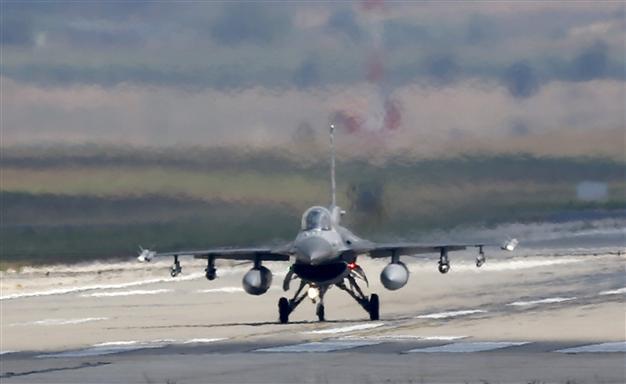Turkish jets join anti-ISIL coalition, hit targets in Syria
ANKARA

A Turkish Air Force F-16 fighter jet lands at İncirlik air base in Adana, Turkey. REUTERS photo
Turkish jets have joined the U.S.-led coalition in the fight against the Islamic State of Iraq and the Levant (ISIL) and hit targets in Syria, the Foreign Ministry has announced.
“Our fighter aircraft, together with Coalition fighter aircraft, began carrying out joint air operations as of yesterday evening against DEASH targets in Syria that also present a threat to our national security,” the Foreign Ministry said in a written statement on Aug. 29, using a variation of the Arabic acronym for ISIL.
Official sources said Turkey’s jets joined air operations in Syria twice, once on Aug. 28 and again on Aug. 29. Two jets were involved in the operation on Aug. 28, in which three targets were hit, while two targets were hit during the operation on Aug. 29, in which two Turkish jets were involved.
Sources said the Turkish jets took off from the İncirlik Air Base in the southern province of Adana and the targets were ISIL positions in the north of Aleppo.
The operations came days after ISIL’s advance in an area in northern Syria that Ankara and Washington had intended to keep clear of the jihadist group and put under the control of moderate rebels. It marked the first time that Turkish jets entered Syrian airspace.
The Foreign Ministry statement said Turkey considered countering terrorist organizations to be “a national security issue of priority.”
“Turkey will continue with firm determination its active support for efforts toward eliminating the threats presented by DEASH, which Turkey put on its own list of terrorist organizations in 2013, both at the national level and as a part of the coalition,” said the ministry.
Last month, Turkey had made a preliminary step toward joining the counter-offensive by allowing U.S. planes to use İncirlik Air Base to attack ISIL positions in Syria. But Turkey’s operations against ISIL had until now been limited.
On July 24, Turkish warplanes attacked ISIL targets in Syria, but not as part of the coalition operation.
U.S. Defense Secretary Ashton Carter last week called on Turkey to commit to playing a full part in the U.S.-led air campaign and to take better control of its border with Syria.
Carter said Ankara had agreed in principle to join the anti-ISIL coalition but should add its own fighter planes to the “air tasking order,” the military structure coordinating strikes.
“They need to join the ATO [Air Tasking Order] and they need to work more on controlling their border. And we’ve made that clear,” he said.
“Their leadership has indicated that this needs to be done. It’s overdue, because it’s a year into the campaign, but they’re indicating some considerable effort now.”
